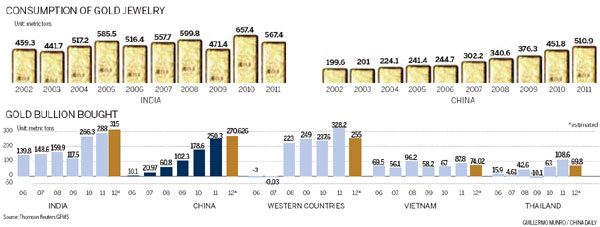|
 |
|
A shop assistant arranges a display showing gold jewelry in a store in Huaibei, Anhui province. Last year, about 496 metric tons of gold were used in the production of jewelry for the Chinese market.[Photo / China?Daily] |
But it remains strong in China, helping to fuel expectation that the price of the metal will be above $1,800 an ounce before the end of this year, experts said on Tuesday.
Because gold prices remain high and concerns have arisen about fluctuations in the metal's price in the short term, the global private sector has been purchasing less of it, said Philip Klapwijk, global head of metals analytics of Thomson Reuters GFMS.
"But the Chinese market remains strong, which makes it an important factor global investors have to focus on."
Last year, China's demand for bullion for investment purposes was strong enough to lead to the sale of 250 metric tons of the metal, an increase of 40 percent. In India, even more gold bars were sold, 288 tons worth.
In the same year, 496 tons of gold were sold in China for use in making jewelry. In India, though, the amount sold for that purpose decreased by 3 percent year-on-year.
"The Chinese demand for jewelry will be similar to that of India in 2012, while China will have more gold bars than India this year," Klapwijk said. "So China is expected to be the world's largest market for gold consumption by the end of the year."
Globally, the amount of gold bought for investment purposes decreased 10 percent year-on-year in 2011, falling to 1,605 tons. Even so, that went for a record high of $81 billion.
Low interest rates, the worsening debt crisis in Europe and concerns about inflation were the main reasons cited for the increase in the value of gold.
Also last year, 2,759 tons of the metal were sold globally for use in manufacturing. That was down 0.9 percent year-on-year, a result largely of a decline in the demand for jewelry.
Klapwijk speculated that central governments are also buying more gold, saying such official buying becomes more influential when the private sector is weak.
A report Klapwijk released on Tuesday said that a modest increase in mine production and a higher supply of scrap gold have led to a record supply of the metal in 2012.
Meanwhile, demand for manufacturing purposes, which mostly comes from jewelry makers, is forecast to fall by a small amount this year.
The report said external economic and financial conditions in the coming months are predicted to attract more money into the gold market. One reason investors are expected to take a greater interest in gold is the likelihood that more countries will ease their monetary policies in the near future.
Klapwijk said the gold market will continue to fluctuate in the very short term, although the price of the metal should remain around $1,500 a troy ounce.
"We would not be surprised if heightened volatility was to continue, in part as investors' interpretation of the impact of macroeconomic news on gold seems to be increasingly variable," he said. "Despite this noise, and the stagnation in the price that we have seen over much of the year-to-date, we believe the gold bull market remains intact.
"Indeed, as we move into the fourth quarter, a clearer uptrend should establish itself, with gold easily breaching the $1,800 mark before year end. A new high for the price does, however, seem to have been postponed until the first half of 2013."
At $1,586.30 a troy ounce, the price of spot gold was little changed at 2:03 pm on Tuesday in Singapore, down from a record of $1,921.15 in September. The price of the metal has increased for 11 straight years, Bloomberg reported.
caixiao@chinadaily.com.cn

